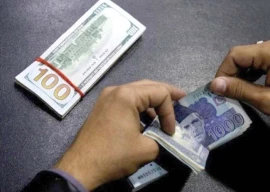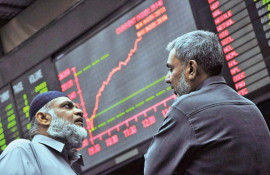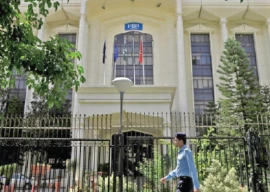
The government has revised the rate of profit on national saving schemes by upto 4.13% to make the schemes lucrative and mobilise investment from the general public, a local research house reported.
The Central Directorate of National Savings (CDNS) has increased the rate of return on Special Savings Certificates (SSC) by 4.13% to 17.13% compared to 13% earlier.
It also revised the rate on Savings Accounts (SA) by 4% to 18.50%, increased the rate on Short Term Savings Certificates (STSC) by 3.86% to 19.82% and surged the rate on Bahbood Savings Certificates (BSC) and Pensioners Benefit Account (PBA) by 2.64% to 16.56% each.
Further, the institution increased the rate of return on Defense Saving Certificates (DSC) by 2.61% to 14.87% and on Regular Income Certificates (RIC) by 0.24% to 12.84%.
A CDNS official told The Express Tribune this week that individual and institutional investors were aggressively pulling out investments from saving schemes after the government failed to raise the rates of return in line with the significant surge in the rates on the instruments in which CDNS reinvests its investors' money.
Moreover, no revision in the rates resulted in the investors "prematurely" withdrawing investment from the schemes and investing in other lucrative instruments like fixed deposits at banks.
The State Bank of Pakistan (SBP) reported on Wednesday that investors withdrew Rs32.38 billion ($190 million) from saving schemes alone in February 2023, with a total disinvestment of Rs285.73 billion ($1.7 billion) in the first eight months (Jul-Feb) of the current fiscal year 2023.
Read Investors withdraw $190m in Feb
The central bank reported that the outstanding investment in saving schemes (net of prize bonds) reduced to Rs2.92 trillion ($17 billion) in February 2023, compared to Rs3.48 trillion ($20 billion) in the same month of the last year, showing a drop of 16% (or Rs565 billion) in one year. The outstanding investment in prize bonds, however, improved to Rs381.5 billion ($2.2 billion) in February 2023, compared to Rs373.4 billion ($2.1 billion) in February 2022.
The bank data suggested that investors pulled out Rs26.68 billion ($157 million) from Defence Saving Certificates (DSC) during Jul-Feb FY23, withdrew another Rs26.76 billion ($158 million) from Regular Income Certificates (RIC), divested Rs71.89 billion ($423 million) from Special Savings Certificates (SSC), and disinvested another Rs167.26 billion ($983 million) from other schemes. They, however, purchased prize bonds worth Rs6.87 billion ($40 million) in the first eight months of FY23.
This is the third consecutive year in a row in which investors have pulled capital from saving schemes.
Earlier, corporate withdrawal was a leading reason behind the aggressive outflows, but now, it was most likely individuals who were divesting due to the offer of low profit.
In 2020, the government barred corporate investors from parking their savings into CDNS saving schemes, as they can invest directly in government debt securities such as three to 12-month T-bills and three to 20-year PIBs.
The outflows from outstanding investments with CDNS were partially seen due to the maturing of investment by corporates or they were prematurely withdrawing the investment to take a position in lucrative instruments like T-bills and PIBs.
CDNS reinvests the funds taken from individuals into three to 10-year PIBs and distributes profits among its investors from the profits earned on PIBs. The weighted average RoR on national saving schemes should be 95% of the return on PIBs as per the relevant law.

1731570137-0/BeFunky-collage-(56)1731570137-0-165x106.webp)
1731570357-0/elon-musk-(1)1731570357-0-165x106.webp)


















COMMENTS (11)
Comments are moderated and generally will be posted if they are on-topic and not abusive.
For more information, please see our Comments FAQ